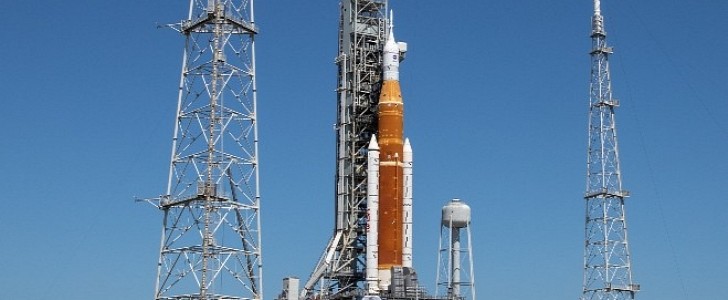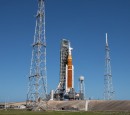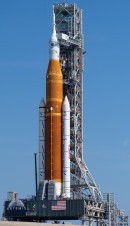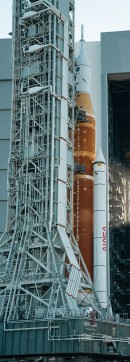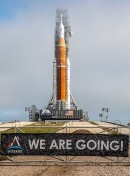As of late August 2022, NASA's Artemis I un-crewed the first test flight of the SLS rocket, and the Orion space capsule is set to launch on August 29th at any time between approximately 8:30 and 10:30 am. But even before the darn thing lifts off the ground, there's a fair amount of public concern about long-term sustainability.
Never mind that as many as half a million people are expected to turn out to Cape Canaveral and the surrounding Central Florida area for the first launch of a human-rated launch vehicle intended to land on another heavenly body in half a century. There are some, mostly on Reddit and Twitter, that thumb their nose at the Artemis program. More specifically, the SLS launch system. Is any of it legitimate? Well, the quick answer is yes, some of it. But not all.
The first red flag people will point to inevitably is price. As much as $23 billion has been spent on research, development, construction, and testing of the SLS system since its design was chosen in favor of the defunct Constellation program and its Ares booster rocket accompaniment. There are those, mostly in the private sector, who believe a reusable, sustainable booster rocket could be possible if NASA just ditched SLS and doubled down on their designs. We're looking at you, Elon Musk. Of course, this was before SpaceX started working with NASA on Artemis, but we remember.
But is this really the case? Well, for one thing, SLS is currently the only existing booster rocket currently capable of lifting a payload of any size beyond Low Earth Orbit on even a theoretical level. For all the talk of how Starship is going to make SLS look like an overpriced waste of money, at least SLS is currently out on a launch pad, ostensibly ready to go into space. We can't say the same about Starship, in spite of how hyped up it is.
In truth, SLS and Starship are two very different animals. SLS is a more conventional approach to putting humans in space, i.e., a big booster rocket with a small command/service module. But what Elon Musk and Starship are attempting to accomplish is to replace the Space Shuttle, beat the SLS, and be the first in line to develop human-rated Lunar and Martian mission technology before the rest of the world even gets close, all with one vehicle.
In a sense, comparing the two rockets in an apples-to-apples manner is difficult, or at worst, a bad faith argument. Another bone of contention between SLS and the space enthusiast community is its clear abundance of warmed-up Space Shuttle technology. Most notable are the solid rocket boosters and quad Aerojet Rocketdyne RS-25 liquid rocket engines. It also doesn't help that the big, orange fuel tanks used on SLS look an awful lot like the old Shuttle's main tank.
But what the public might find lame or drab, NASA calls affordable. To imagine how gargantuan the cost overruns might be for SLS to have 100% brand new flight hardware, we'd need to take the already ostensibly overblown $24-ish billion bill racked up currently and add an extra several billion for brand new engines, fuel tanks, and solid rocket boosters. Now tell us, which would be the more ridiculously overpriced and silly moon rocket?
We understand why to some people, a new booster rocket without fancy new engines and boosters might not sound all that interesting. Just as with cars, where we want new engines with more power, the same is true with rockets. But in the case of SLS, the old saying if it ain't broke, don't fix it, has never been more appropriate. It just goes to show how the priorities of NASA and the public differ so dramatically.
Furthermore, it's important to understand that the Apollo missions weren't cheap either. As many as half a million people were employed in everything from manufacturing, logistics, and of course, flight operations themselves from the mid-1960s through the 70s. The cost per launch during the Apollo days is estimated to have cost the 2022 equivalent of $1.3 billion. Not far off from the $1.5 to 2 billion estimate pegged for SLS per launch.
We leave you with one final thought. Before you call the SLS rocket an overpriced, overhyped bucket of bolts, we implore you to at least let the gosh darn thing lift off the pad before you pass judgment. This isn't a new supercar from a rival brand of your favorite carmaker. Its uses are much more important than that. If all goes according to plan, we will have our one small step for man, one giant leap for mankind moment. With that in mind, it should be clear that when all said and done, concrete results will always trump mean tweets, YouTube hot takes, and sub-Reddit posts. We should treat it in no other fashion. So please, lighten up, would you?
The first red flag people will point to inevitably is price. As much as $23 billion has been spent on research, development, construction, and testing of the SLS system since its design was chosen in favor of the defunct Constellation program and its Ares booster rocket accompaniment. There are those, mostly in the private sector, who believe a reusable, sustainable booster rocket could be possible if NASA just ditched SLS and doubled down on their designs. We're looking at you, Elon Musk. Of course, this was before SpaceX started working with NASA on Artemis, but we remember.
But is this really the case? Well, for one thing, SLS is currently the only existing booster rocket currently capable of lifting a payload of any size beyond Low Earth Orbit on even a theoretical level. For all the talk of how Starship is going to make SLS look like an overpriced waste of money, at least SLS is currently out on a launch pad, ostensibly ready to go into space. We can't say the same about Starship, in spite of how hyped up it is.
In truth, SLS and Starship are two very different animals. SLS is a more conventional approach to putting humans in space, i.e., a big booster rocket with a small command/service module. But what Elon Musk and Starship are attempting to accomplish is to replace the Space Shuttle, beat the SLS, and be the first in line to develop human-rated Lunar and Martian mission technology before the rest of the world even gets close, all with one vehicle.
In a sense, comparing the two rockets in an apples-to-apples manner is difficult, or at worst, a bad faith argument. Another bone of contention between SLS and the space enthusiast community is its clear abundance of warmed-up Space Shuttle technology. Most notable are the solid rocket boosters and quad Aerojet Rocketdyne RS-25 liquid rocket engines. It also doesn't help that the big, orange fuel tanks used on SLS look an awful lot like the old Shuttle's main tank.
But what the public might find lame or drab, NASA calls affordable. To imagine how gargantuan the cost overruns might be for SLS to have 100% brand new flight hardware, we'd need to take the already ostensibly overblown $24-ish billion bill racked up currently and add an extra several billion for brand new engines, fuel tanks, and solid rocket boosters. Now tell us, which would be the more ridiculously overpriced and silly moon rocket?
We understand why to some people, a new booster rocket without fancy new engines and boosters might not sound all that interesting. Just as with cars, where we want new engines with more power, the same is true with rockets. But in the case of SLS, the old saying if it ain't broke, don't fix it, has never been more appropriate. It just goes to show how the priorities of NASA and the public differ so dramatically.
Furthermore, it's important to understand that the Apollo missions weren't cheap either. As many as half a million people were employed in everything from manufacturing, logistics, and of course, flight operations themselves from the mid-1960s through the 70s. The cost per launch during the Apollo days is estimated to have cost the 2022 equivalent of $1.3 billion. Not far off from the $1.5 to 2 billion estimate pegged for SLS per launch.
We leave you with one final thought. Before you call the SLS rocket an overpriced, overhyped bucket of bolts, we implore you to at least let the gosh darn thing lift off the pad before you pass judgment. This isn't a new supercar from a rival brand of your favorite carmaker. Its uses are much more important than that. If all goes according to plan, we will have our one small step for man, one giant leap for mankind moment. With that in mind, it should be clear that when all said and done, concrete results will always trump mean tweets, YouTube hot takes, and sub-Reddit posts. We should treat it in no other fashion. So please, lighten up, would you?
